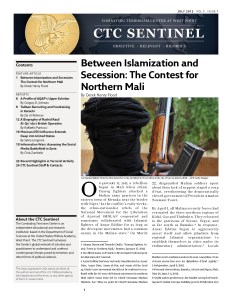Cover Story Overview
Between Islamization and Secession: The Contest for Northern Mali
By Derek Henry Flood
On January 17, 2012, a rebellion began in Mali when ethnic-Tuareg fighters attacked a Malian army garrison in the eastern town of Menaka near the border with Niger. In the conflict’s early weeks, the ethno-nationalist rebels of the National Movement for the Liberation of Azawad (MNLA) cooperated and sometimes collaborated with Islamist fighters of Ansar Eddine for as long as the divergent movements had a common enemy in the Malian state. On March 22, disgruntled Malian soldiers upset about their lack of support staged a coup d’état, overthrowing the democratically elected government of President Amadou Toumani Touré. Today, the northern two-thirds of Mali have become a safe haven for Ansar Eddine, al-Qa`ida in the Islamic Maghreb (AQIM), and the Movement for Unity and Jihad in West Africa (MUJAO)—three Salafi-jihadi groups. This article highlights several of the core issues at stake both for West Africa and the wider world in northern Mali’s vast breakaway region. First, it analyzes the long-held separatist roots of the present conflict. Second, it examines Ansar Eddine’s narrow Islamist worldview in context of the events unfolding in Timbuktu. Finally, it looks into the near decade-long U.S. military relationship with Mali.
 Skip to content
Skip to content

